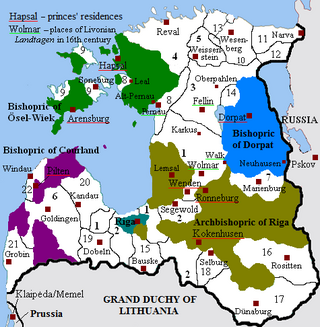
Livonia or in earlier records Livland, is a historical region on the eastern shores of the Baltic Sea. It is named after the Livonians, who lived on the shores of present-day Latvia.

The Northern Crusades or Baltic Crusades were Christianization campaigns undertaken by Catholic Christian military orders and kingdoms, primarily against the pagan Baltic, Finnic and West Slavic peoples around the southern and eastern shores of the Baltic Sea, and also against Orthodox Christian East Slavs.
The Livonian Brothers of the Sword was a Catholic military order established in 1202 during the Livonian Crusade by Albert, the third bishop of Riga. Pope Innocent III sanctioned the establishment in 1204 for the second time. The membership of the crusading order comprised warrior monks, mostly from northern Germany, who fought Baltic and Finnic polytheists in the area of modern-day Estonia, Latvia and Lithuania. Alternative names of the Order include Christ Knights, Swordbrothers, Sword Brethren, Order of the Brothers of the Sword, and The Militia of Christ of Livonia. The seal reads: +MAGISTRI ETFRM MILICIE CRI (Christi) DE LIVONIA.

The Livonian Order was an autonomous branch of the Teutonic Order, formed in 1237. From 1435 to 1561 it was a member of the Livonian Confederation.

The Livonian War (1558–1583) was fought for control of Old Livonia. The Tsardom of Russia faced a varying coalition of the Dano-Norwegian Realm, the Kingdom of Sweden, and the Union of the Grand Duchy of Lithuania and the Kingdom of Poland.

Wolter or Walter von Plettenberg was Master (Landmeister) of the Livonian Order from 1494 to 1535, and one of the greatest leaders of the Teutonic knights. He was an important early Baltic German.
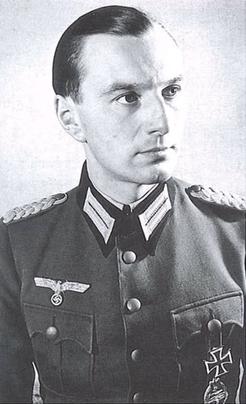
Alexander Otto Hermann Wolfgang Bernd(t) Freiherr Freytag von Loringhoven, was a Baltic German officer in the German Army during World War II. In 1956, he joined the German Federal Armed Forces, the Bundeswehr, and rose to the rank of Generalleutnant.
Wessel Oskar Karl Johann Freiherr Freytag von Loringhoven, was a Baltic German colonel in the High Command of the German Armed Forces (OKW) and a member of the German Resistance (Widerstand) against Adolf Hitler. Loringhoven was a friend of Claus von Stauffenberg, who was the leader of the 20 July Plot to assassinate Hitler in 1944.

The Bishopric of Courland was the second smallest (4500 km2) ecclesiastical state in the Livonian Confederation founded in the aftermath of the Livonian Crusade. During the Livonian War in 1559 the bishopric became a possession of Denmark, and in 1585 sold by Denmark to Poland–Lithuania.

The Livonian crusade consists of the various military Christianisation campaigns in medieval Livonia – modern Latvia and Estonia – during the Papal-sanctioned Northern Crusades in the 12th–13th century. The Livonian crusade was conducted mostly by the Holy Roman Empire and the Kingdom of Denmark. It ended with the creation of Terra Mariana and the Danish duchy of Estonia. The lands on the eastern shores of the Baltic Sea were one of the last parts of Europe to be Christianised. The available information is largely based on Livonian Chronicle of Henry.

The Freytag von Loringhoven is a German noble family that originated in Westphalia. It was an Uradel family whose name is also spelled as Vrydach, Frydag, Freydag and various other slightly different spellings.
The Battle of the Siritsa River took place on 27 August 1501 between the forces of the Livonian Order under Grand Master Wolter von Plettenberg on the one side and the forces of the Grand Duchy of Moscow and Pskov Republic on the other. The Russian forces were soundly defeated.
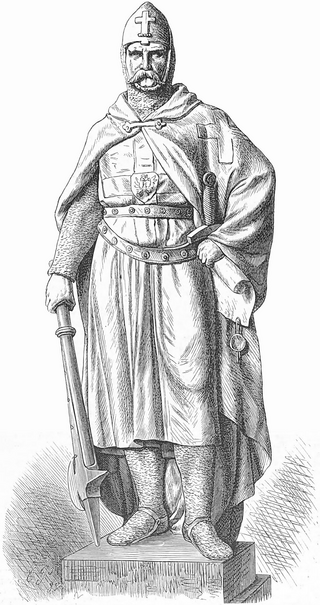
Hermann Balk, also known as Hermann von Balk or Hermann Balke, was a Knight-Brother of the Teutonic Order and its first Landmeister, or Provincial Master, in both Prussia and Livonia. From 1219 to 1227, he served as the Deutschmeister in the Order's Province of Alemannia. Balk led the crusaders during the Prussian Crusade and became Master of Prussia in 1230. From 1237 to 1238, he also served in the additional role as Master of Livonia.
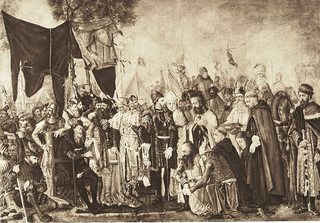
The Treaty or Peace of Pozvol, Pasvalys or Pozwol was a peace treaty and an alliance concluded on 5 and 14 September 1557 between the Livonian Confederation and the Polish-Lithuanian union, whereby the former put its territories under Polish-Lithuanian protection. The treaty was preceded by disputes between the members of the Livonian Confederation and military pressure by Sigismund II Augustus, King of Poland and Grand Duke of Lithuania, and provoked Russian tsar Ivan IV "the Terrible" to start the Livonian War.
The Battle of Turaida or Treiden was fought on June 1, 1298, on the banks of the Gauja River near the Turaida Castle. The Livonian Order was decisively defeated by the residents of Riga allied with the Grand Duchy of Lithuania under command of Vytenis.

Terra Mariana was the formal name for Medieval Livonia or Old Livonia. It was formed in the aftermath of the Livonian Crusade, and its territories were composed of present-day Estonia and Latvia. It was established on 2 February 1207, as a principality of the Holy Roman Empire, and lost this status in 1215 when Pope Innocent III proclaimed it as directly subject to the Holy See.

Hugo Friedrich Philipp Johann Freiherr von Freytag-Loringhoven was a Prussian general and a writer on military matters, being awarded the Pour le Mérite in 1916 for his work as a historian.
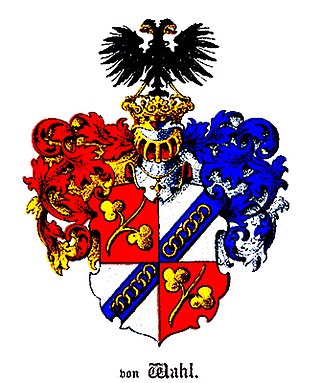
The Wahlfamily is a noble family originating in Scotland which later settled in the Baltic states.

The Frydag family, also spelled Vrydach, Freytag, Freydag and various other slightly different spellings, is a German noble family known since the beginning of the 14th century that originated in Uradel in Westphalia.

Landmeister in Livland was a high office in the Teutonic Order. The Landmeister administered the Livonia of the Teutonic Order. These lands had fallen to the Teutonic Order in 1237 by the incorporation of the former Livonian Brothers of the Sword. The seat of the Landmeister was castle Wenden. The Landmaster's function in Livonia lasted until 1561, when in aftermath of Livonian War the last Landmeister Gotthard Kettler relinquished the northern parts of the Mastery and in the Union of Vilna secularized the part still left to him and, as the Duchy of Courland and Semigallia, took fief from the Polish king and Grand Duke of Lithuania Sigismund II Augustus. The non-recognition of this act by Pope, Holy Roman Empire and the Grand Master of the Teutonic Order had no factual effect.
















